Table of Contents
Decoding cloudy pools: When Pool is Cloudy But Chemicals are Fine. Dive into expert solutions for crystal-clear water and peace of mind. We all want a shiny, pristine pool to gaze at and go swimming in, but what happens when it’s not looking its best? Cloudy pool water can not only be an eyesore but you may also be worried about the safety of swimming in murky pool water. An in-ground pool can become cloudy and murky for many reasons.
Before you go off the deep end thinking the worst, here are some suggestions that may help you clear up your cloudy pool water on your own.
4 Main Reasons for Cloudy Pool Water
There are four main reasons your pool water may appear cloudy.
1. Chemistry is off.
The chemistry may be off, and require some tweaking. If you are a pool pro, you may be able to do this yourself. If not, you should hire a professional to help solve the problem of cloudy water.
2. Filtration issue.
You may have a filtration issue that is causing your swimming pool to look murky. Again, you may be able to figure out if this is your issue on your own. When in doubt, consult a pool technician.
3. Poor water circulation.
Poor circulation may be causing the cloudiness. We have included some troubleshooting ideas for this, but if it seems too tricky, call in the professionals.
4. Environmental debris.
Environmental debris may be causing the pool water to accumulate excess solids. We know summertime can get busy with what we call “heavy bather loads”. Learn how to prevent cloudy pool water from ruining your crystal-clear pool this summer.
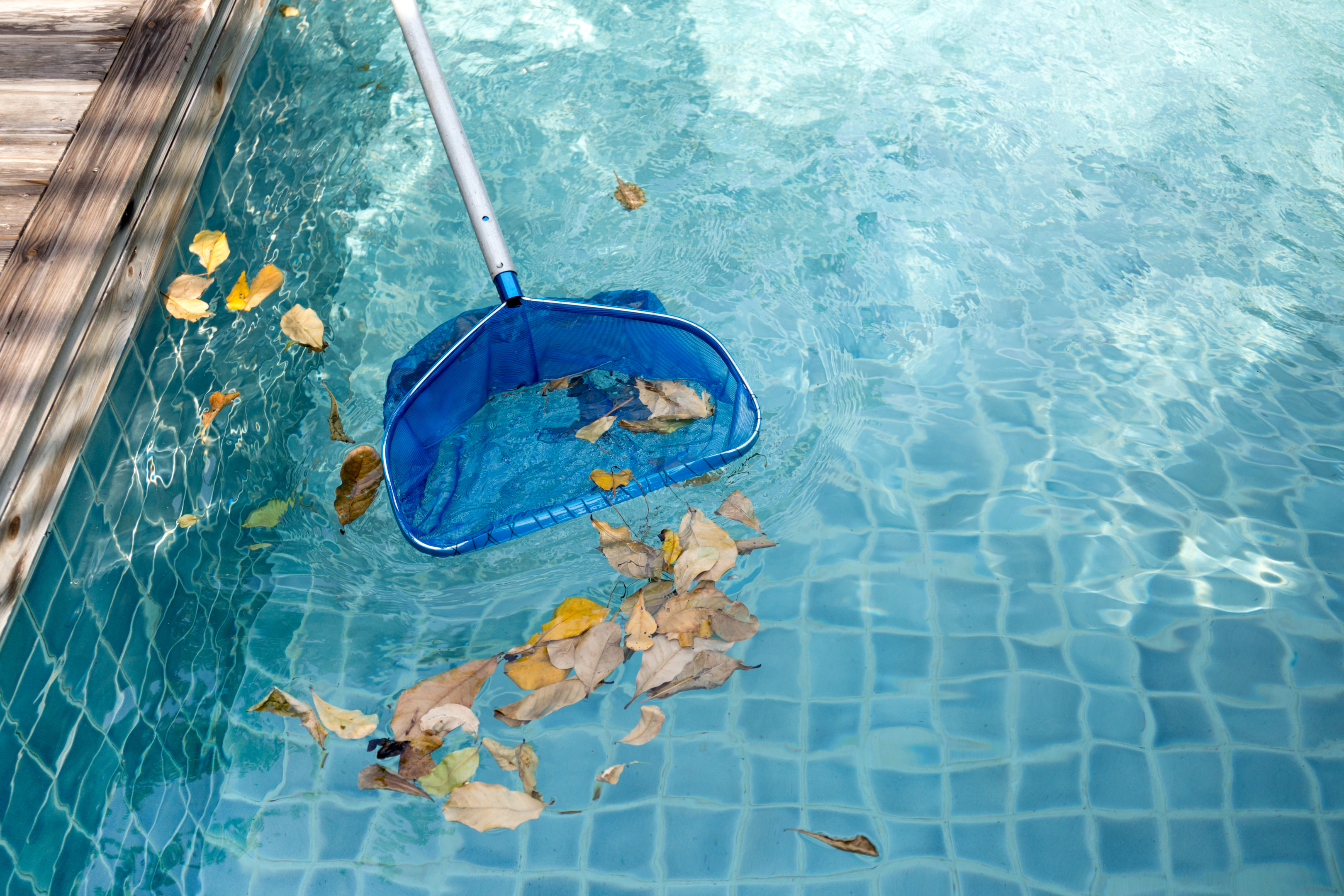
In order to try and address the problem of cloudy pool water, it is essential to figure out why it has become cloudy in the first place. This list has the most common reasons your pool water may not be looking its best.
Chemistry
Creating a balanced pool water environment with chemicals is an essential part of weekly upkeep and maintenance. When the chemicals, or pH levels, are off, you will have a hard time maintaining a clear pool.
Properly monitoring and adjusting water chemistry is a necessary part of maintenance and upkeep, especially if you have recurrent cloudy water. Some levels you will want to know if your pool has been less than clear lately are: free chlorine, combined chlorine, pH, total alkalinity, calcium hardness, cyanuric acid levels, and total dissolved solids. You can also test for metals and phosphates.
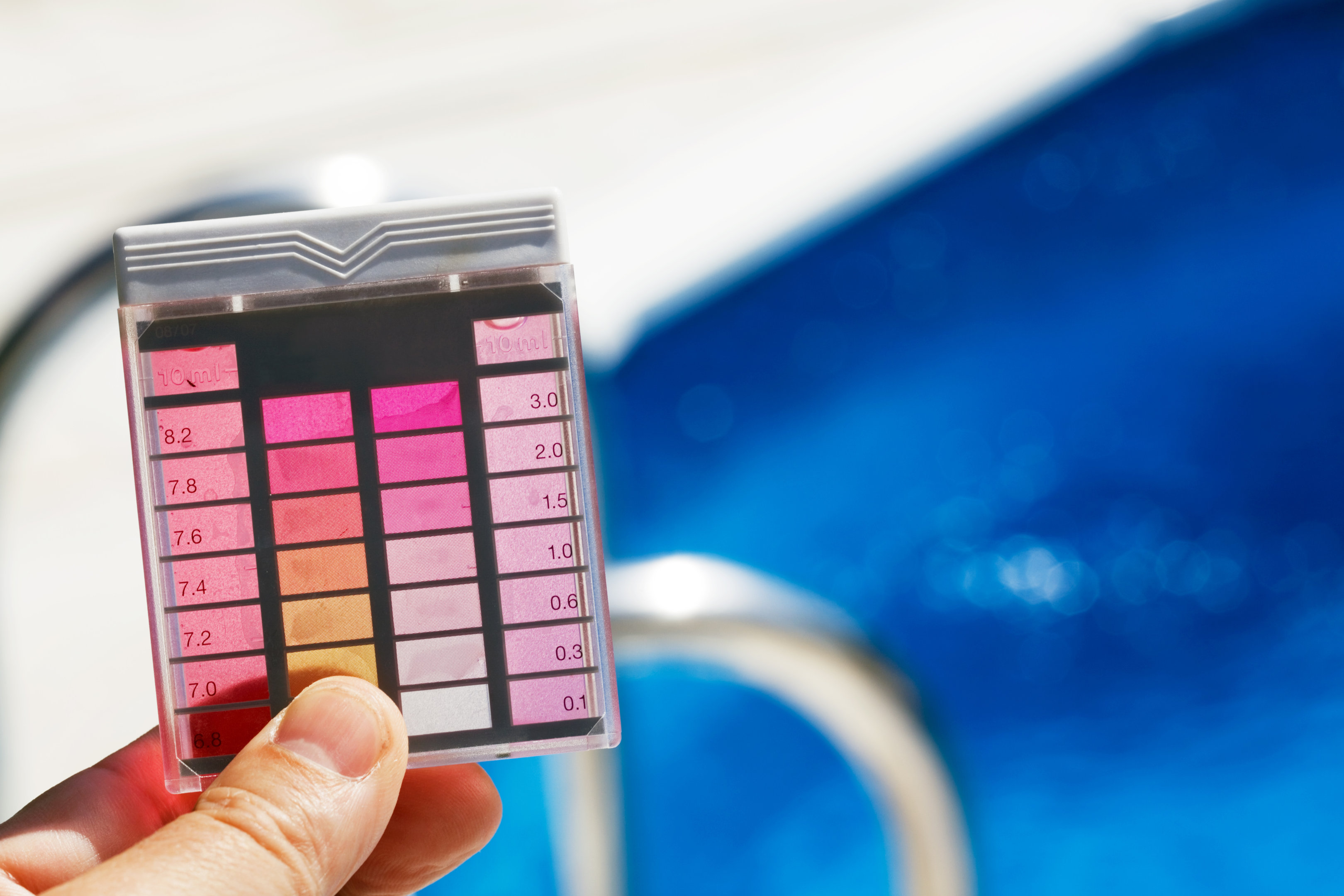
When there is a chemical imbalance, the water in the pool may be too harsh for swimmers, or not clean enough to inhibit bacteria growth. This can make your pool cloudy, and potentially put your pool equipment, and even the pool itself, at risk of damage.
What If the Chemistry is “Fine”?
If a technician tells you the chemicals are “fine”, but your pool water is cloudy, we recommend asking them some questions to get to the bottom of what they mean.
How long have the chemicals been “fine”? Have they looked good for weeks, or are they just now looking good after their visit? When was the last time they were checked? When can they come back to check the progress of their solution?
Ideally, your pool chemicals should be checked every week for consistency. If there have been major changes, your technician should be able to identify these changes and help you figure out a plan of action.
Checking Your Own Chemicals
If you check the chemicals in your pool yourself, whether by water test strips or a test kit, you will want to make sure chemical levels are balanced before moving on to other possible reasons and solutions for your cloudy pool.
If there are chemical imbalances, then there are ways to get this under control including a pool shock, or adding a sanitizing agent. You can also determine your pool’s total alkalinity, which will determine whether or not it needs a conditioner, liquid chlorine, a pool water clarifier or pool flocculant, or other chemicals to help balance it out.
This can be a tricky thing to do on your own, however, so please know your limits and seek help when and if you need it.
When in Doubt, Trust the Professionals
If you do not know how to check chlorine levels or balance your own pool water chemistry, seek guidance from your pool technician, or ask for advice from a local pool store. They may add muriatic acid, a shock treatment, cyanuric acid, calcium hypochlorite, or other chemicals. A pool maintenance technician can also check your levels of TDS (total dissolved solids).
Please remember that some of these chemicals can be dangerous and you should always seek the advice of professional pool service technicians if you are not sure of what you are doing.
Filtration
The next thing that should be checked when you are trying to figure out why your pool water is cloudy is making sure everything about your filtration system is in order. If your pool has poor filtration, there will be tiny particles that stay in the water, even if your pool filter is running. This will result in a cloudy pool.
There are a few things you can check to see if poor filtration or damage is the reason for your cloudy pool water.
Possible Filtration Issues
One thing that should be checked is whether or not the pool’s filter is working properly. If the blowback coming from the filter is dirty, then it may be time to call a pool service technician to check the internal components of the pool filter.
Another thing that may be causing cloudy water in your swimming pool is if there are holes, cracks, or the filter itself is damaged. If this is the case, it cannot properly filter out fine particles, and those will return to your pool, causing cloudy water.
If your chemicals are balanced, and your pool filter seems to be in order, then you may be dealing with a lack of suction or circulation in your pool.
Circulation
Many times, when a pool is cloudy, there are problems with the overall pool circulation, causing a build-up of algae growth and organic debris. Thankfully, there are a few things pool owners can do to try and fix this issue.
The following list can help check suction and poor circulation, therefore troubleshooting this issue. Once suction is improved, you will be able to remove small particles and dead algae from the pool easily.
Poor Circulation Troubleshooting
Inside your pump, plug the incoming pipe. Open and close the suction valves to test each line and see if there is enough suction there.
Double-check that your vacuum is properly connected to the skimmer basket port, and make sure the hose is not damaged. Also, check all hose cuffs.
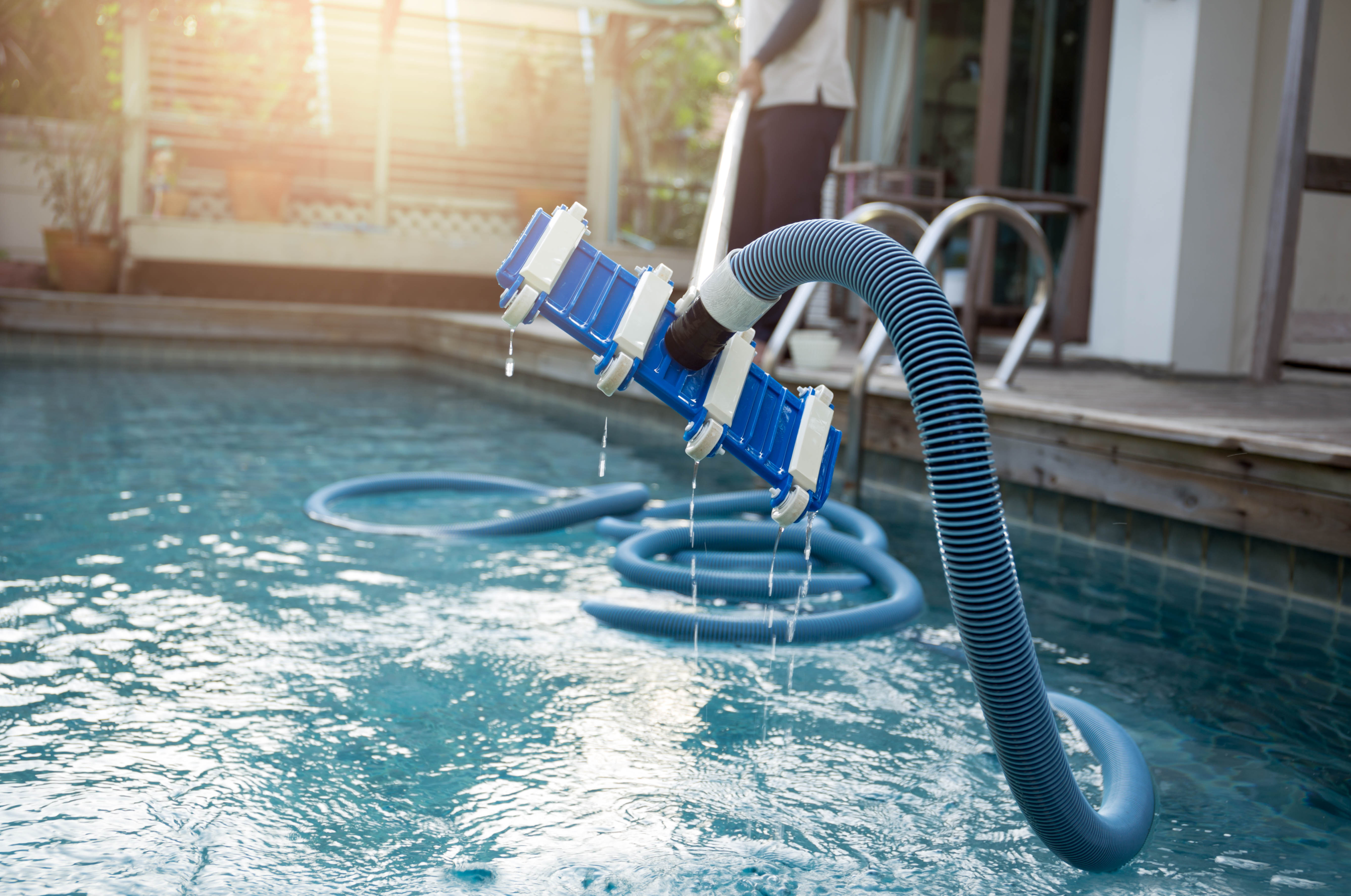
Check is your skimmer basket. Is it full? Is there a blockage? If so, clean it out. This may be the best-case scenario, with a very simple solution.
Check the pressure gauge on your filtration system. If the PSI is too high (8-10 above where it should be for a clean pressure reading) do a backwash or hose off your cartridge filters. There are videos to help you do this, or you can ask a pool technician for help.
Other Possible Solutions
If none of those actions led to a solution, try running your pump at a higher RPM for 8 hours a day. You can also run your pump extra time for a few days to give it a chance to properly clean all of the organic matter in your pool water.
If you have tried all of the above troubleshooting, the chemicals in your pool are balanced, and your filter is in good working order, then it may be a problem with environmental debris.
Environment
Despite our best efforts as pool owners, pool water sometimes just gets overloaded with body oils, hair, pollen, dirt, food, backyard debris and other particles from sunscreen, lotion, or makeup. Even the sun’s UV rays can damage free chlorine levels in your pool, causing cloudy pool water.
During the summer, when swimming pool water chemistry is put to the test by constant use, a cloudy pool is a common natural consequence.
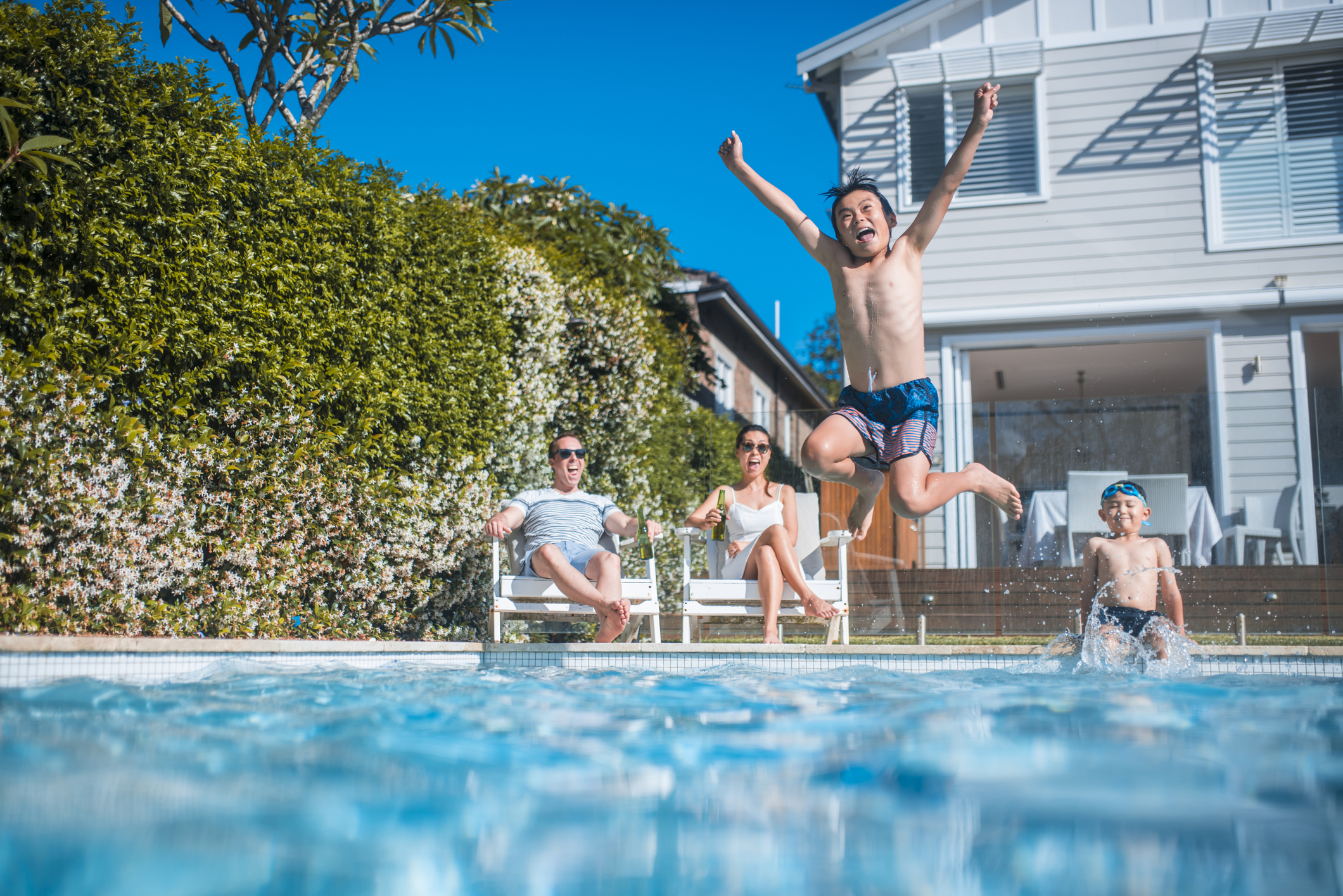
Friends, family, pets, and even pool crashers like ducks, can all affect chlorine levels, and chemistry, and cause cloudy-looking water. Add sunscreen and a nice summer breeze, and you’ve got a recipe for murky pool water!
How to Minimize Environmental Debris
Make sure that during the busy season, you are checking your filter system, taking a daily or weekly water sample to check chlorine levels, using test strips or a test kit, and emptying out skimmer baskets frequently.
You will also need to skim your pool as necessary to limit the amount of debris that sinks to the bottom. Large amounts of leaves, feathers, flowers, grass, or other items can clog your filtration system, and break down, causing dirt to disperse throughout the pool resulting in cloudy pool water.
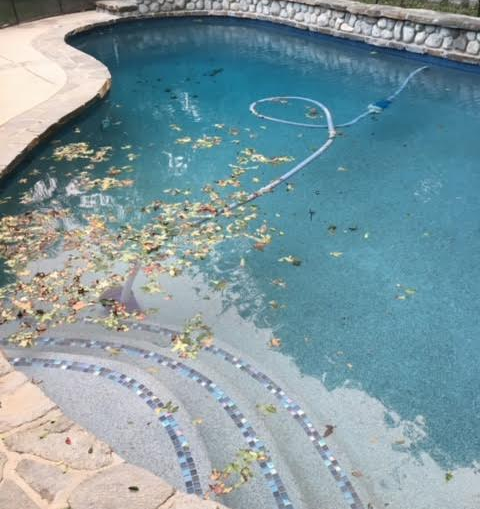
Weekly maintenance and pool care is also essential in order to keep your swimming pool from becoming too murky.
Preventative Measures
Once you get your cloudy water under control, or if you are lucky enough to not have dealt with this issue, we recommend preventative measures. As Jack Dempsey wisely said, the best defense is a good offense. Putting measures into place before your pool develops cloudy water can be well worth the investment.
Cover the Pool
The biggest way to keep out dirt and unwanted particles is to cover your pool when it is not being used. There are several options when it comes to covering your swimming pool.
For a few hundred dollars you can get a winter cover or a solar cover that can protect your pool. For slightly more, you can get a safety cover that will do the double duty of protecting your pool and your loved ones. Your local pool supply store can help you find the right kind of cover for your pool and your region.
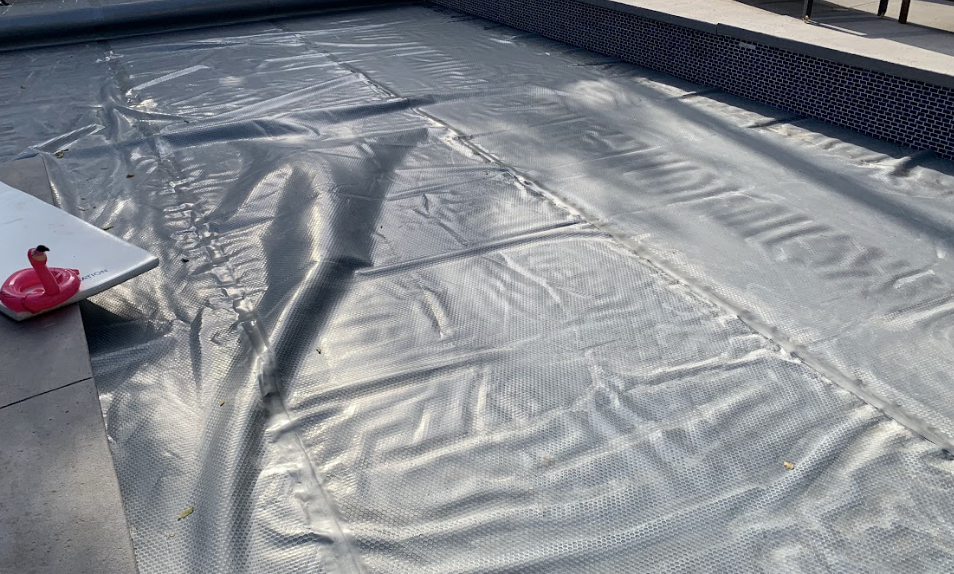
No matter your budget, a pool cover can be an inexpensive way to avoid a cloudy pool.
Showering
Have you ever noticed that public pools often ask swimmers to shower before entering the swimming pool? Asking guests to rinse off before coming into your swimming pool can help minimize outside particles being added to your pool water. If you don’t have an outdoor shower, a good old fashioned hose will do the trick, especially if you’re just spraying off dirt from feet and hands.
No wonder outdoor showers are becoming more and more popular!
Keep Pets Out
We know your animals love a good splash as much as you do, but pets in the pool, especially dogs that can shed and leave hair or dirt in the pool, could be making your pool cloudy.
Dogs also just love to get in the pool after laying in the yard or digging in the dirt. Hello, cloudy water! If you are okay with your pet joining you for a swim, we recommend at least trying out the shower or hose rinse rule with them, too.
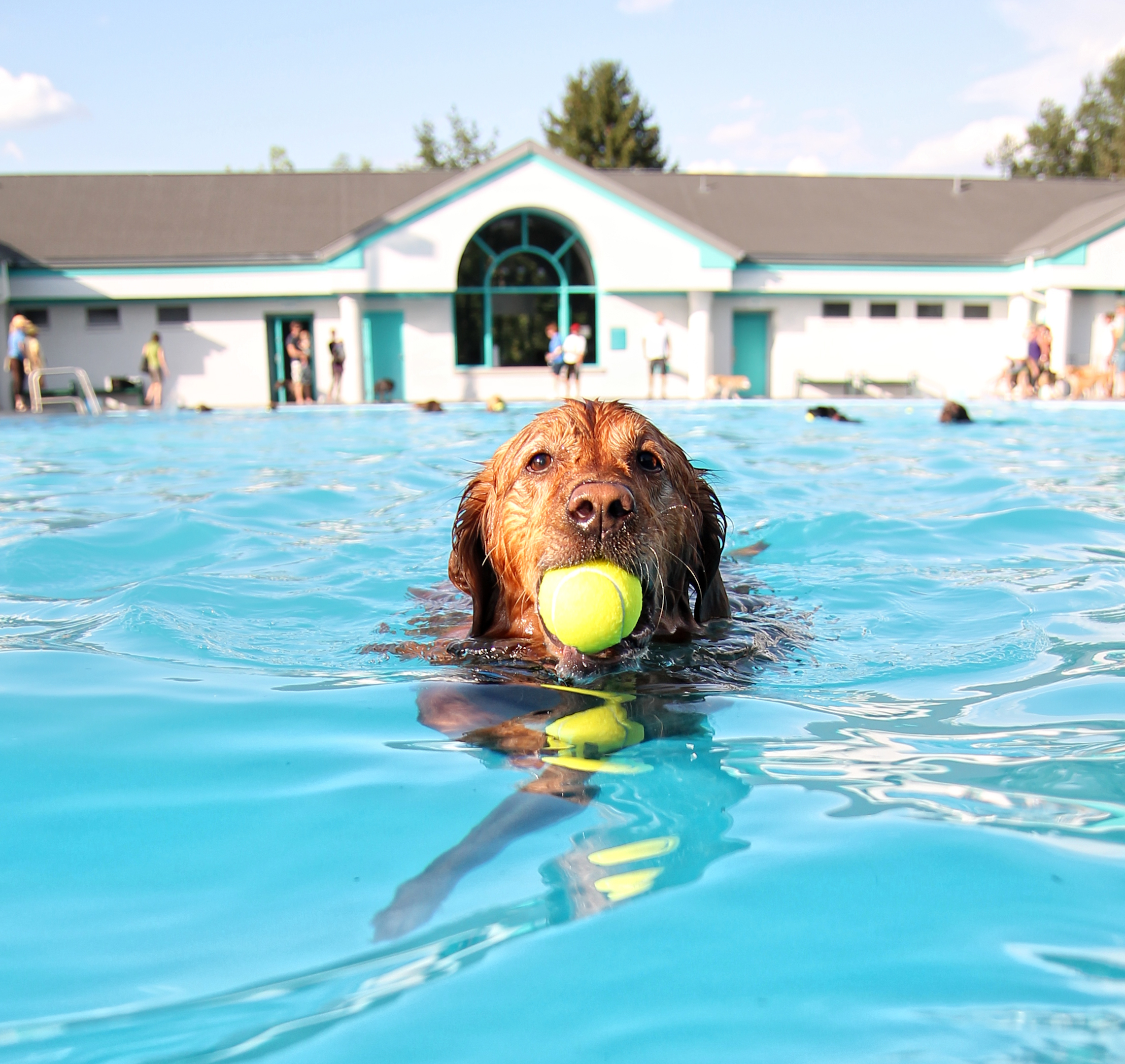
Small changes like these can go a long way to keeping your pool water clear and your water chemistry balanced.
A Last Resort
If you have tried absolutely everything, and your pool water simply will not stay clear, it may be time to drain your pool and replace it with new water.
When you decide to do this, and empty out the cloudy pool water, you can take the time to inspect your filtration system and strainer baskets, give your pool a good brush and scrub, clean out a dirty filter, make any minor patching or repairs as necessary, and fill it with fresh water.
After this process, your pool technician will do a water test, bring chlorine levels up to where they should be, and make sure the pH balance of your newly filled pool is accurate. Your pool water will hopefully be clean and clear, erasing all memories of cloudy pool water and chemical imbalance issues.
Need Help?
We highly recommend finding a weekly maintenance company that can help you with all your swimming pool needs, including staying on top of your filtration system. Preventative maintenance can help eliminate the occurrence of cloudy pool water and other safety and aesthetic issues.
Stanton Pools offers weekly maintenance in Ventura and Los Angeles counties. We also are here should you need help or direction if you find any structural damage or issues while troubleshooting your cloudy pool water. Give us a call at (888) 214-0425 to see what we can help you with today.
Although we provide weekly maintenance, we specialize in swimming pool remodelling and renovation. If you have been thinking about upgrading your pool or backyard area, we are happy to provide you with more information.
Check out some of our work at www.stantonpools.com and fill out the contact form if you are interested in speaking with us. Let us show you what we can do for you- we’re here to help transform your pool into your oasis.




0 Comments